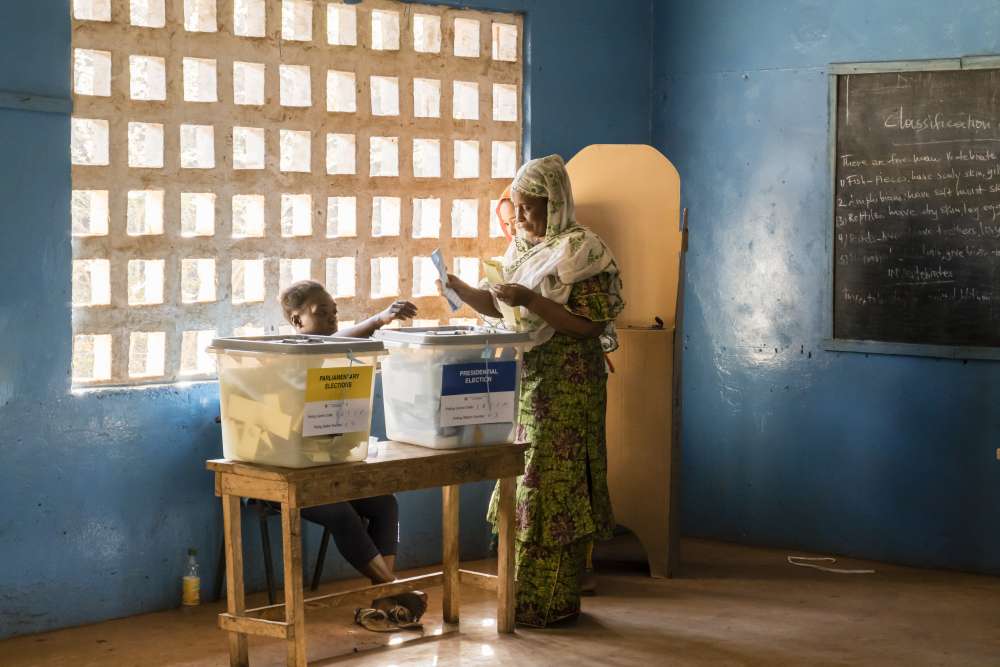Is Fiction Worse Than Fact?
How Countering False Information Is an Essential Part of Securing Sierra Leone’s Democracy

Last month, both sides claimed victory in Sierra Leone’s presidential elections. Even as votes were still being counted, the incumbent President Julius Maada Bio (who was eventually re-elected) and the main opposition leader, Samura Kamara, declared they had won. Alongside this, accusations that results were “implausible” and “rigged,” led many local and international observers, including the National Election Watch, the EU and the US, to condemn “irregularities in the election results.” The Electoral Commission of Sierra Leone has only added fuel to the fire, responding to calls demanding detailed election results with claims that this would break existing norms and itself represents a form of misinformation. All told, the elections have been a stark reminder that Sierra Leone’s democracy, carefully rebuilt over the last 21 years since its civil war, needs continual work.
This is not least because this controversy – alongside ever changing voting systems and biased censuses – has seen diminishing trust in the electoral process. Recent pre-election poll data demonstrated that voters are disillusioned by the functioning of their democracy. Younger generations are particularly devoted to a pluralistic Sierra Leone, but also demonstrate significantly lower trust in the governments’ current capacity to deliver on those ideals, compared to their older counterparts. This is not helped by the spread of false information online, which is impacting national debates in Sierra Leone like everywhere else in the world. Widespread distrust seems to be at the heart of the deepening cleavages in Sierra Leonean society, creating “fertile ground for the spread of falsehoods and rumors.”
The way in which this is playing out in Sierra Leone is very different to Europe and the US, making copy-paste models from these contexts wholly ineffective. Three quarters of the population lack access to the internet, meaning that the way false information spreads is different. Lies and rumors “move between online and offline environments with regularity and ease, with offline rumors returning “online, reinforcing the falsehood or skewing reality even further.” Those engaged in these cycles are often the “types of people who would conventionally shape political debate across traditional media.” For instance, they are often based in the capital (“where almost 30% of the electorate cast their ballots and where results are most closely contested”) or may be journalists and radio presenters who then share on their shows (70% of the population in Sierra Leone get their information from the radio). This describes an information space that policymakers, journalists and even investors must comprehend beyond surface level penetration statistics.
This has made the task for stopping the spread of false information near impossible for under-resourced international efforts. UNDP, the Independent Radio Network of Sierra Leone and BBC Media Action, among others, have made concerted efforts to combat the ways in which false information is spread during the election. They established a website for citizens to submit potentially false stories, used radio broadcasts to magnify validated information, and trained journalists in discerning between fact and fiction when researching stories online. However, these are small efforts, with limited capacity – for instance – to direct people to their website or listen to their broadcasts.
In comparison, they face a huge swell of online accusation, lies and falsities being shared from an often more influential quarter of the population to the rest of Sierra Leone in ways that are hard to predict, mitigate or stop. A quick scroll through Twitter will reveal the extent of the fake news that remains published online, prevalent despite efforts to educate the public. From doctored Tweets claiming that Kamara conceded defeat (before the votes were counted) to forged election results updated by the minute, to fake letterheads and accounts disguised as official election observers, the online space in Sierra Leone remains cluttered with disinformation.
Rather than investigating the unique way in which false information is spreading from the online to offline space in places like Sierra Leone, social media companies are consistently doing less than the bare minimum to stop harms perpetuating on their platforms. Twitter laid off most of its workers in Africa last year; while TikTok and Meta have faced legal action for their treatment of content moderators, with some even claiming it is “unclear” whether Meta’s platforms in sub-Saharan Africa are being reviewed at all. This all speaks to a situation where social media companies, far from adapting to the unique needs of the way information spreads on the continent, have in fact long failed to do the bare minimum to stop the spread of lies.
According to reports from June 29, Sierra Leone is one of the 45 countries set to benefit from the International Fact-Checking Network’s “Global Fact Check Fund” with a $13.2 million grant directly from Google/YouTube. The implementer, West Africa’s DUBAWA/Centre for Journalism Innovation and Development plans on hiring fact-checkers and a videographer to increase the reach of its projects. Yet, even though this is more than most, there is a risk that fact-checking initiatives have become a mere buzzword for many social media companies, used to avoid making larger long-term investment in improving the cultural, linguistic, and larger contextual nuances of their content moderation systems and algorithms.
Calls to revamp the electoral infrastructure are not unfounded, but it is equally important to maintain a credible information space. Investing more in understanding the way information spreads is the least social media companies can do alongside tailoring its content moderation policies in a context-sensitive approach. Civil society, on the other hand, must echo the idea that any emphasis on structural change must then go hand in hand with efforts to protect the reliability of information in Sierra Leone.
This commentary was originally published in Democracy in Africa on August 03, 2023.







